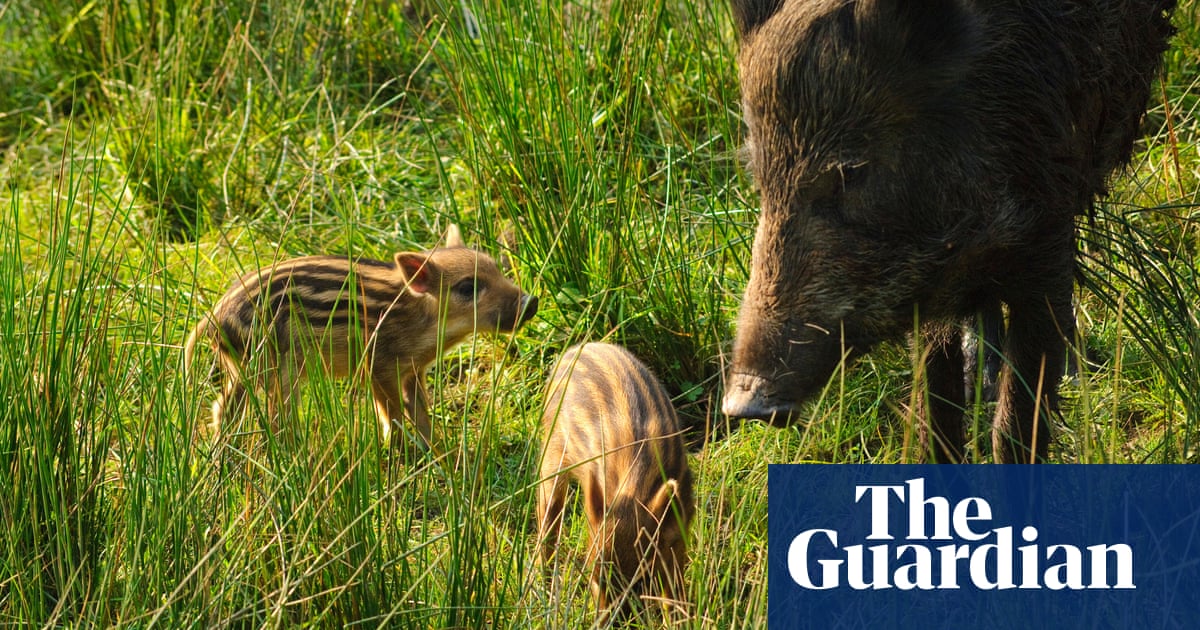
Britain likes to think of itself as a nation of animal lovers – though from the beast of Bodmin to XL bullies, we seem just as attached to lurid accounts of their unpredictable menace. Naturalist Chantal Lyons has a diagnosis for what she calls our “national zoophobia”. It’s “a symptom of our isolation”: as a society, we simply don’t have enough contact with wild nature not to be terrified of it. In September, a government-led report on biodiversity observed: “Nature is still seriously declining across the UK, a country that is already one of the most nature-depleted in the world.” Over the past half-century, the populations of UK species have declined by an average of 19%, with one in six now at risk of extinction: what wildness we have left is diminished, corralled and thoroughly unthreatening.
Groundbreakers tells the story of the uncomfortable disruption of this status quo by a large-headed, fleet-footed interloper: Sus scrofa, the wild boar. Lyons, a naturalist and science communicator, traces the scrappy, unofficial populations that have sprung up across Britain since the 1980s, the first since they were hunted to extinction more than 300 years ago. The descendants of farmed animals that escaped or were deliberately released, they exist in a legal and cultural limbo, without official recognition as a wild native species. About 2,600 animals now live wild from south-east England to north-west Scotland, with their stronghold in the ancient Forest of Dean in Gloucestershire. Lyons goes in search of them – with forays to larger, more unruly populations in France and Spain, where the singer Shakira claimed two boar stole her handbag in a Barcelona park in 2021 – to discover the impact of their return.
They weren’t always so hard to find. About 8,000 years ago, around a million wild boar roamed the dense forests that then covered Britain, preyed on by wolves, lynx and brown bears. Over the centuries, they entered the psyche of its human inhabitants as a symbol of ferocity and courage – the Anglo-Saxon Sutton Hoo helmet features gilded boar’s-head decoration – and became linked to feasting at the midwinter celebrations of Yule, and later Christmas. But by the early middle ages they were already in retreat. By 1086, according to the Domesday Book, the woodland and wood-pasture habitat that the boar relied on had been reduced to 15% of England’s land area. The last great winter feasts of wild boar were in the 13th century – Henry III served 200 of them at Christmas 1251 – and by the 17th century, they had disappeared entirely. They became ghost presences in British culture: confined to pub signs, the processing of a scarlet papier-mache head through the City of London, the coat of arms of Queen Camilla.
From her base in the Forest of Dean, Lyons taps into networks of local enthusiasts, wildlife photographers, rangers and boar-haters who help her find traces of the elusive animals. Groundbreakers is rich in evocative accounts of her own solitary, wonder-charged encounters, from resonant snorts and grunts in the darkness to glimpses of sows leading litters of the boarlets known as “humbugs” for their striped coats. Their advocates describe boars’ many contributions to our ecosystems: ploughing up the earth for tasty acorns, tubers, bulbs and grubs, they benefit wild flowers, trees, birds and other animals. They encourage the return of a shrub layer in woodland, and break up the choking swathes of a single plant species – in Britain usually bracken – that spring up on depleted and mismanaged land.
The arguments for “rewilding” may sound unassailable. But Lyons’ even-handed, empathic interviews also bring up its challenges, from the necessity of culling to walkers feeling threatened in the forest (despite tabloid horror stories, there have been just two recorded instances of minor injuries caused by boar in the UK in 30 years). The growing question of how wild we are prepared for this tamed land to become is a taste of mainland Europe’s debates over life alongside its far more extensive populations of wild boar and wolves. Groundbreakers is as much about 2020s Britain as it is about wild boar – ploughing up thoughtless assumptions along with manicured lawns, they “have the audacity to challenge what we were once certain of: that every other being on this island is terrified of us”.
after newsletter promotion
